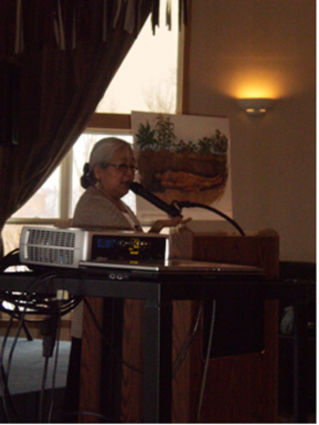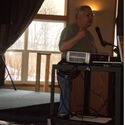Haudenosaunee Seed Exchange Workshop
Ohsweken, Haudenosaunee Territory

Renee Thomas - Hill
On March 30, 2011, different families across the confederacy attended the Haudenosaunee Seed Exchange Workshop in Ohsweken (Six Nations) that was sponsored by Deyohaha:ge (two roads), Indigenous Knowledge Center, Joint Stewardship Board, Six Nations Farmers Market & Community Planning, Brantford Native Housing/Community Support Services, and Six Nations Health Promotion & Nutrition Services.
About 75 people attended the workshop and got to exchange many Haudenosaunee seed varieties with the local farmers from Ohsweken and people from other Haudenosaunee communities including Cattaraugus, Tonawanda, Onondaga, Tuscarora, Akwesasne and Kahnawake. We also heard some good speakers talk about how important it is to preserve our seeds and eat foods grown from our own gardens which is healthy for us, mentally, physically and spiritually.
The first speaker was Renee Thomas-Hill. She talked about that our seeds are like children. We have to take care of them and nurture them so they can take care of us when they get older. The seeds teach us about responsibility and bring out the good human being and peace within all of us. The seeds tell us a story and history of who we are and how we need to bring these stories back to our youth, so they can continue this work into the future.
Next Frances Burning who works for Kayanase – Restoring the Earth, an organization dedicated to restoring species at risk in the area and our seeds is one of them. They are presently bringing back the butternut and black ash trees along with wild ginseng that were once Indigenous to these areas. They have the green houses, so if we provide them the seeds, they will grow them, but then we need the people to plant them.

Atentsiats King checking out the seeds
After lunch, we heard from Dr. Jane Mt. Pleasant speak about the History of the Haudenosaunee growing corn. The reason our people grew white corn is because you can feed more people per acre than growing wheat. The reason our people planted in mounds is because if you plow a field, you strip all the nutrients out of the ground. The reason we wash our corn in wood ashes is to decrease the cooking time and increase the nutritional value of the corn, imagine how long it would take to boil the corn in just plain water to break the shell off the corn. You would go through a lot of wood back in the olden days.
The last speaker for the day was Steve McComber from Kahnawake who has been collecting the Haudenosaunee seeds since the mid-1970s. He has been visiting the different Haudenosaunee communities collecting these seeds and the stories that go with it; who had the responsibility of caring for these seeds all these years. He emphasized that we have to concentrate on growing our own foods, because the foods we get from the grocery store are making us sick. They are genetically modified and sprayed with pesticides and insecticides.
We were sad the workshop came to a close, but we were encouraged to keep up the good work to those that are still carrying on the tradition of preserving our seeds for the future generations.










Reader Comments(0)